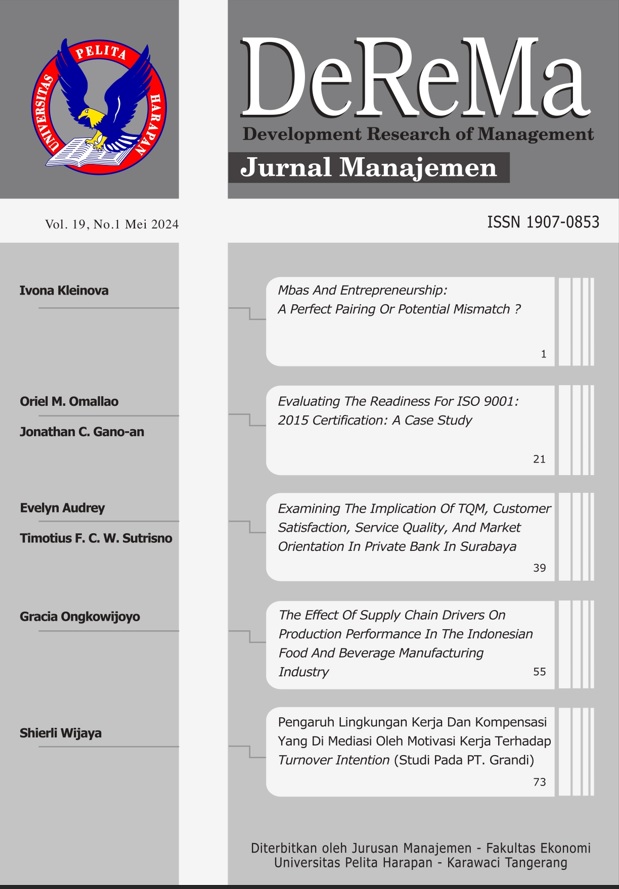THE EFFECT OF SUPPLY CHAIN DRIVERS ON PRODUCTION PERFORMANCE IN THE INDONESIAN FOOD AND BEVARAGE MANUFACTURING INDUSTRY
DOI:
https://doi.org/10.19166/derema.v19i1.8066Keywords:
Innovation, Demand Optimization, Partnership in Production, Production PerformanceAbstract
The food and beverage industry is a major contributor to the Indonesian economy, and the Covid-19 epidemic heavily influenced its supply chain sustainability. The purpose of this study is to examine the effect of innovation and demand optimization on partnerships in production and production performance in the food and beverage manufacturing industry in Indonesia. This research is a quantitative study using PLS-SEM. Data collection in this study was carried out by distributing questionnaires with a sample of 54 respondents of owners and managers working in the medium-large food and beverage manufacturing companies in Indonesia. The findings indicate that innovation and demand optimization can encourage companies to do partnerships in production. Innovation and demand optimization also shown to improve company’s production performance. However, there is no significant effect between partnerships in production and production performance. This is because partnerships often experience a dilemma due to the influence on company performance which may either be favorable or unfavorable to the production performance. The research findings extend literature of supply chain management in the context of internal perspectives of the companies. The context of the research is limited to small numbers of medium-large companies in Indonesia, thus, call for further examination with a larger sample size and in different contexts for further finding generalization. This research provides broader view on the internal perspectives of company’s supply chain management through the perspective of Resource Based View, as well as providing several suggestions for managers of medium-large food and beverage manufacturing companies in developing countries.
Abstrak dalam Bahasa Indonesia. Industri makanan dan minuman merupakan kontributor utama perekonomian Indonesia, dan pandemi Covid-19 sangat mempengaruhi keberlanjutan rantai pasokannya. Tujuan dari penelitian ini adalah untuk menguji pengaruh inovasi dan optimalisasi permintaan terhadap kemitraan produksi dan kinerja produksi pada industri manufaktur makanan dan minuman di Indonesia. Penelitian ini merupakan penelitian kuantitatif dengan menggunakan PLS-SEM. Pengumpulan data pada penelitian ini dilakukan dengan menyebarkan kuesioner dengan sampel sebanyak 54 responden pemilik dan manajer yang bekerja pada perusahaan manufaktur makanan dan minuman menengah-besar di Indonesia. Temuan menunjukkan bahwa inovasi dan optimalisasi permintaan dapat mendorong perusahaan untuk melakukan kemitraan dalam produksi. Inovasi dan optimalisasi permintaan juga terbukti meningkatkan kinerja produksi perusahaan. Namun, kemitraan produksi tidak berpengaruh signifikan terhadap kinerja produksi. Hal ini disebabkan karena kemitraan produksi seringkali mengalami dilema apakah bisa menguntungkan atau merugikan terhadap kinerja produksi. Temuan penelitian ini memperluas literatur manajemen rantai pasokan dalam konteks perspektif internal perusahaan. Konteks penelitian ini terbatas pada sejumlah kecil perusahaan menengah-besar di Indonesia, sehingga memerlukan penelitian lebih lanjut dengan jumlah sampel yang lebih besar dan dalam konteks yang berbeda untuk meningkatkan generalisasi temuan penelitian. Penelitian ini memberikan pandangan yang lebih luas mengenai perspektif internal manajemen rantai pasok perusahaan melalui perspektif Resource Based View, serta memberikan beberapa saran bagi para manajer perusahaan manufaktur makanan dan minuman menengah-besar di negara berkembang
References
Agustin, E. S. A. S., Offermans, A., & Arifin, B. (2023). The impact of partnership forms on the improvement of coffee farmers welfare. Sustainability Science and Resources, 5, 20-32. https://doi.org/10.55168/ssr2809-6029.2023.5002
Barney, J. (1991). Firm resources and sustained competitive advantage. Journal of Management, 17(1), 99-120. https://doi.org/10.1177/014920639101700108
Belderbos, R., Carree, M., & Lokshin, B. (2004). Cooperative R&D and firm performance. Research Policy, 33(10), 1477-1492. https://doi.org/10.1016/j.respol.2004.07.003
Braun, M. W., Rivera, D. E., Flores, M. E., Carlyle, W. M., & Kempf, K. G. (2003). A model predictive control framework for robust management of multi-product, multi-echelon demand networks. Annual Reviews in Control, 27(2), 229-245. https://doi.org/10.1016/j.arcontrol.2003.09.006
Cetindamar, D., Çatay, B., & Serdar Basmaci, O. (2005). Competition through collaboration: Insights from an initiative in the Turkish textile supply chain. Supply Chain Management: An International Journal, 10(4), 238-240. https://doi.org/10.1108/13598540510612686
Cooper, D. R., & Schindler, P. S. (2014). Business research methods. McGraw-Hill Irwin.
de Leeuw, S., & Fransoo, J. (2009). Drivers of close supply chain collaboration: One size fits all? International Journal of Operations & Production Management, 29(7), 720-739. https://doi.org/10.1108/01443570910971397
Eisenhardt, K. M., & Martin, J. A. (2000). Dynamic capabilities: What are they? Strategic Management Journal, 21(10-11), 1105-1121. https://doi.org/10.1002/1097-0266(200010/11)21:10/11<1105::AID-SMJ133>3.0.CO;2-E
Ettlie, J. E., & Reza, E. M. (1992). Organizational integration and process innovation. The Academy of Management Journal, 35(4), 795-827. https://doi.org/10.2307/256316
Farida, N. L. (2020). Dampak Corona terhadap industry food and beverage dan solusi yang ditawarkan agar Bisnis Tetap Berjalan. SSRN Electronic Journal. https://doi.org/10.2139/ssrn.3623058
Febrianto, N., Akhiroh, P., Helmi, M., & Hartono, B. (2023). Effects of partnership patterns on broiler chickens performance in the agribusiness system of Indonesia. Journal of World's Poultry Research. https://doi.org/10.36380/jwpr.2023.36
Hair, J. F., Jr., Hult, G. T. M., Ringle, C. M., & Sarstedt, M. (2017). A primer on partial least squares structural equation modeling (PLS-SEM) (2nd ed.). Sage.
Han, W., Huang, Y., & Macbeth, D. (2017). Performance measurement of cross-culture supply chain partnership: A case study in the Chinese automotive industry. International Journal of Production Research, 56(7), 2437-2451. https://doi.org/10.1080/00207543.2017.1377357
Karmaker, C. L., Ahmed, T., Ahmed, S., Ali, S. M., Moktadir, M. A., & Kabir, G. (2021). Improving supply chain sustainability in the context of COVID-19 pandemic in an emerging economy: Exploring drivers using an integrated model. Sustain Prod Consum, 26, 411-427. https://doi.org/10.1016/j.spc.2020.09.019
Lambert, D. M. (2010). Supply chain management - Processes, partnerships, performance. https://doi.org/10.1007/978-3-8349-6515-8_29
Lambert, D. M., Emmelhainz, M. A., & Gardner, J. T. (1996). Developing and implementing supply chain partnerships. The International Journal of Logistics Management, 7(2), 1-18. https://doi.org/10.1108/09574099610805485
Lasi, H., Fettke, P., Kemper, H.-G., Feld, T., & Hoffmann, M. (2014). Industry 4.0. Business & Information Systems Engineering, 6(4), 239-242. https://doi.org/10.1007/s12599-014-0334-4
Legg-Jack, D., & Ndebele, C. (2022). Relevance of industry stakeholder partnership in the production of skilled electrical engineering trade graduates. International Journal of Research in Business and Social Science (2147- 4478), 11(10), 398-409. https://doi.org/10.20525/ijrbs.v11i10.2148
Lin, K.-Y., & Hu, L. (2022). Supply and demand optimization of agricultural products in game theory: A state-of-the-art review. Journal of Engineering Management and Systems Engineering, 1(2), 76-86. https://doi.org/10.56578/jemse010205
Lo, E. K., & Pushpakumara, C. (1999). Performance and partnership in global manufacturing-modelling frameworks and techniques. International Journal of Production Economics, 60(61), 261-269. https://doi.org/10.1016/S0925-5273(98)00150-9
Lorentz, H. (2008). Collaboration in Finnish”Russian supply chains. Baltic Journal of Management, 3(3), 246-265. https://doi.org/10.1108/17465260810902351
Mahulae, B. C., Seciawang, S. J., Wahyuningsih, & SD, T. (2022). Peran praktik lean, strategi manajemen inovasi dan orientasi lingkungan pada keberlanjutan organisasi melalui manajemen rantai pasokan hijau pada industri ecommerce di Indonesia. Development of Research Management, 17(1), 99-117. https://doi.org/10.19166/derema.v17i1.5128
Mohr, J., & Spekman, R. (1994). Characteristics of partnership success: Partnership attributes, communication behavior, and conflict resolution techniques. Strategic Management Journal, 15(2), 135-152. https://doi.org/10.1002/smj.4250150205
OECD & Eurostat. (2005). Oslo manual: Guidelines for collecting and interpreting innovation data (3rd ed.). OECD Publishing.
Ongkowijoyo, G., Sutrisno, T. F. C. W., Teofilus, T., & Hongdiyanto, C. (2020). Adaptive supply chain management under severe supply chain disruption: Evidence from Indonesia. Journal of Distribution Science, 18(11), 91-103.
Pan, F., & Nagi, R. (2010). Robust supply chain design under uncertain demand in agile manufacturing. Computers & Operations Research, 37(4), 668-683. https://doi.org/10.1016/j.cor.2009.06.017
Qarahasanlou, A. N., Barabadi, A., & Ayele, Y. Z. (2017). Production performance analysis during operation phase: A case study. Proceedings of the Institution of Mechanical Engineers, Part O: Journal of Risk and Reliability, 232(6), 559-575. https://doi.org/10.1177/1748006X17744383
Rajapathirana, R. P. J., & Hui, Y. (2018). Relationship between innovation capability, innovation type, and firm performance. Journal of Innovation & Knowledge, 3(1), 44-55. https://doi.org/10.1016/j.jik.2017.06.002
Rezaei, J., Ortt, R., & Trott, P. (2018). Supply chain drivers, partnerships and performance of high-tech SMEs. International Journal of Productivity and Performance Management, 67(4), 629-653. https://doi.org/10.1108/IJPPM-01-2017-0017
Sahoo, S., & Yadav, S. (2017). Entrepreneurial orientation of SMEs, total quality management and firm performance. Journal of Manufacturing Technology Management, 28(7), 892-912. https://doi.org/10.1108/JMTM-04-2017-0064
Sutrisno, T. F. C. W. (2019). Relationship between total quality management element, operational performance and organizational performance in food production SMEs. Jurnal Aplikasi Manajemen, 17(2), 285-294. https://doi.org/10.21776/ub.jam.2019.017.02.11
Vicario, V., & Nawangpalupi, C. B. (2020). The role of partnership in production towards performance of Indonesia’s micro and small enterprises. International Journal of Economics, Business and Accounting Research, 4(4), 1000-1011.
Wahab, N. Y. A., Yusuff, Y. Z., Musa, R., & Rusnifaezah, R. (2020). The influence of innovation on SMEs business performance in the manufacturing sector. International Journal of Supply Chain Management, 9(2), 263-267.
Zainal, N. N., Hassam, S. F., Shaharudin, M. R., Akbar, J., & Mustafa, M. A. (2018). Contributing factors of production performance in the food processing industry. International Journal of Supply Chain Management, 7(6), 221-230.
Downloads
Published
Issue
Section
License
Authors who publish with this journal agree to the following terms:
1) Authors retain copyright and grant the journal right of first publication with the work simultaneously licensed under a Creative Commons Attribution License (CC-BY-SA 4.0) that allows others to share the work with an acknowledgement of the work's authorship and initial publication in this journal.
2) Authors are able to enter into separate, additional contractual arrangements for the non-exclusive distribution of the journal's published version of the work (e.g., post it to an institutional repository or publish it in a book), with an acknowledgement of its initial publication in this journal.
3) Authors are permitted and encouraged to post their work online (e.g., in institutional repositories or on their website). The final published PDF should be used and bibliographic details that credit the publication in this journal should be included.





